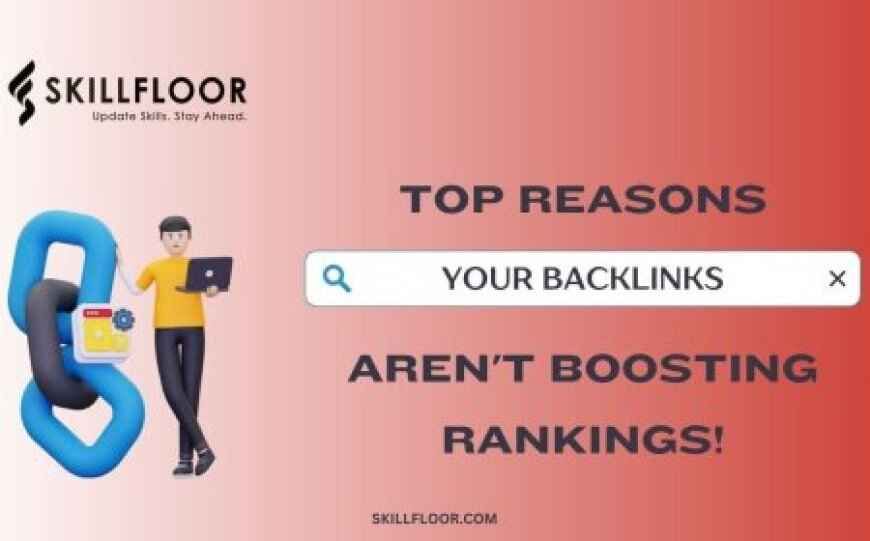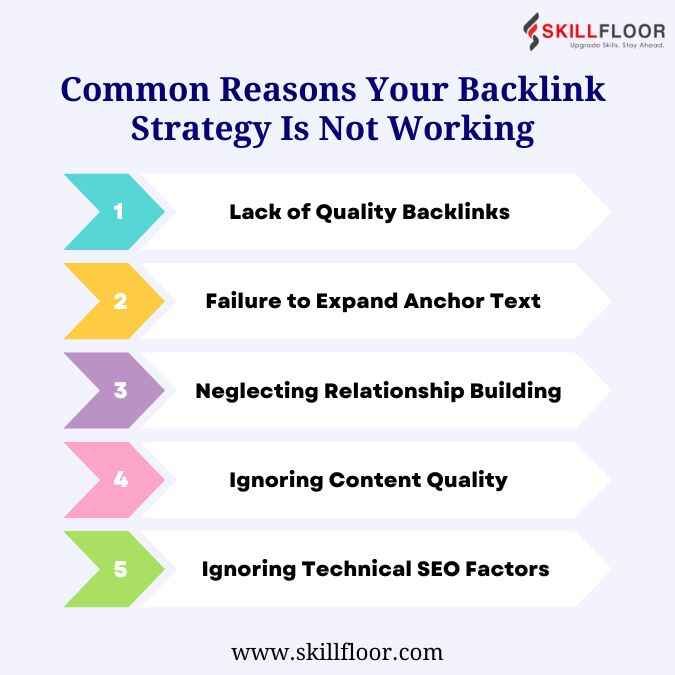Why Your Backlink Strategy Is Not Working
Explore the common pitfalls in backlink strategies that hinder SEO performance, including poor quality links, lack of diversity, and more

Backlinks are still an important part of any effective digital marketing strategy in the ever-changing SEO world. Despite investing time and resources in backlink building, many website owners are frustrated with the lack of returns. In this detailed article, we'll look at the typical issues that may be limiting the efficiency of your backlink strategy and present actionable tips to help you overcome them.
Backlinks, sometimes called inbound links or incoming links, are hyperlinks that take users from one website to another. They act as a vote of confidence from one site to another, informing search engines that the linked-to site is credible, trustworthy, and worthy of higher search engine ranks.
Backlinks are important in SEO for a variety of reasons. For starters, they are an important ranking element for search engines, with websites with more and higher-quality backlinks often ranking higher in search results. Furthermore, backlinks aid in increasing website authority, driving referral traffic, and improving online exposure, making them essential for any thorough SEO plan.
Common Reasons Your Backlink Strategy Is Not Working
-
Lack of Quality Backlinks
A lack of quality backlinks is one of the most common reasons why your backlink strategy may be failing. Backlinks are not all created equal, and search engines favor links from authoritative and relevant domains. If your backlinks are mostly from low-quality or irrelevant sources, they may not be given much weight by search engines, reducing their impact on your search ranking.
-
Failure to Expand Anchor Text
Anchor text diversity is critical to a good backlink strategy. Using the same anchor text repeatedly can appear odd to search engines, potentially resulting in fines or worse ranks. Instead, try to diversify your anchor text by using variations of your target keywords, branded terms, and generic phrases. This natural fluctuation indicates to search engines that your backlink profile is organic and diverse, which boosts your overall SEO performance.
-
Neglecting Relationship Building
Building relationships with other website owners, bloggers, and industry influencers is typically required for effective backlink development. Simply reaching out and requesting backlinks without first developing a genuine connection is unlikely to produce beneficial results. Spend time networking, engaging with individuals in your niche, and providing value to build mutually beneficial relationships that can lead to future backlink chances.
-
Ignoring Content Quality
The quality of your content is crucial in generating backlinks from other websites. Other website owners are unlikely to link to content that is not informative, engaging, or beneficial to their target audience. Focus on producing high-quality, shareable content that meets your audience's requirements and interests. By continuously providing good material, you boost your chances of gaining natural backlinks from authoritative sources.
-
Ignoring Technical SEO Factors
Technical SEO difficulties might reduce the efficiency of your backlink strategy by preventing search engines from crawling and indexing your website. Common technical difficulties, like as poor page performance, broken links, and incorrect canonicalization, can reduce your site's visibility in search results and impede backlink acquisition attempts. Conduct regular technical audits of your website to discover and resolve any issues that may be hurting its SEO performance.

Optimizing Your Backlink Strategy
1. Focus on Quality over Quantity
Prioritize quality over quantity instead of simply counting backlinks. Look for ways to generate backlinks from credible websites with high domain authority and relevance to your niche. Invest time and resources in developing valuable material that will elicit links from authoritative sources.
2. Emphasize Relevance and Diversity
Make sure your backlink profile is diverse and related to the content and industry of your website. Look for ways to get backlinks from a range of sources, including industry journals, specialty blogs, and reliable directories. Diversifying your link-building activities will help you reduce the danger of algorithmic penalties while also increasing the trustworthiness of your website in the eyes of search engines.
3. Change your anchor text.
Expand your anchor text to achieve a natural-looking link profile while avoiding over-optimization. Use a combination of branded anchor text, generic terms, and long-tail keywords to show search engines that your backlinks are authentic and organic.
4. Monitor and maintain your backlink profile.
Monitor your backlink profile regularly for symptoms of spammy or dangerous links, and then take steps to disavow or remove them. Furthermore, continue to aggressively seek fresh backlink chances while ensuring that your link-building activities are consistent and persistent over time.
5. Invest in technical SEO
Invest in technical SEO to fix any underlying issues that are limiting the efficiency of your backlink strategy. Conduct regular technical audits on your website and resolve any issues as soon as possible to ensure that search engine bots can efficiently crawl and index your backlinks.
How long does it take to see results from a backlink strategy?
Implementing a backlink strategy is a critical component of SEO and digital marketing that aims to increase a website's exposure and authority. The time frame for seeing real effects from such an approach can vary greatly depending on many factors. To begin, the level of competition in your field is critical. Because of the huge amount of content and backlinks previously built by competitors, significant improvements may take longer to observe. Second, the quality and relevancy of backlinks earned are critical. High-quality backlinks from authoritative websites relevant to your subject are more valuable to search engine algorithms and can speed up results.
It's realistic to expect some initial benefits within a few months of executing a backlink strategy. However, major improvements in rankings and organic traffic can necessitate patience and commitment over several months to a year. Consistency in obtaining backlinks and constantly refining your technique is essential. To assess the efficiency of your efforts, you must closely monitor important performance measures such as keyword ranks, organic traffic, and domain authority. As your website gathers more high-quality backlinks, you can expect a progressive increase in search engine ranks and general internet visibility.
In the world of digital marketing, agility and adaptability are essential. As search engine algorithms change and competition shifts, you must alter your backlink strategy accordingly. Some techniques for diversifying and strengthening your backlink profile include guest blogging, providing shareable content, engaging in industry forums, and leveraging social media marketing networks. While there is no one-size-fits-all answer to how long it takes to see results from a backlink strategy, adhering to best practices and being current on industry trends can help accelerate the path to enhanced SEO performance and long-term online success.
A successful backlink strategy involves more than merely getting a large number of links. By focusing on quality over number, diversifying anchor text, developing genuine relationships, prioritizing content quality, and resolving technical SEO concerns, you may increase the effectiveness of your backlink strategy and produce tangible results for your company.




























































